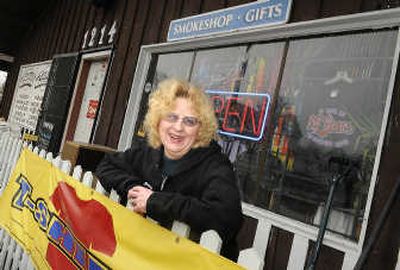City may tighten up on drug paraphernalia

Spokane is on its way to having one of the strictest laws in the nation regarding drug paraphernalia.
A revised ordinance to be considered by City Council members Monday night would vastly expand what can be considered a vehicle for drug use. And it would ban items such as glass tubes with flowers stuffed inside them – even if they are marketed as novelties – from convenience stores and gas stations.
The revision spells out in more detail what the city considers drug paraphernalia, said City Prosecutor Howard Delaney, who worked on the changes. The definitions address manufacturers that have “managed to stretch the definition of novelty to legitimate items of drug paraphernalia,” Delaney said.
The city began working on the ordinance early this year after Spokane resident Mike Conrad went to the council. The 23-year-old found glass pipes intended for smoking crack or methamphetamine marketed as “Love Roses” or “Happy Valentines” at more than 12 locations in the area. Mayor Mary Verner and the council asked for an ordinance review.
“I wanted to make a significant impact on the vehicles that are being used for drugs,” said Conrad, who said he is pleased with the council’s support and fast action. “I didn’t want teenagers to have access to drug paraphernalia. I know people can smoke out of anything. But to have something that’s blatantly obvious and available, that’s not OK.”
If approved, the revised ordinance will go further than state and federal laws in defining drug paraphernalia.
Conrad said his goal was to make it illegal for gas stations to sell meth pipes.
“But the icing on the cake is it will impact the head shops,” he said. “I envision that these places will be shut down by the end of the year. And I plan to see to it that that happens.”
Head shops traditionally sell items such as water pipes or bongs, which can be used for smoking tobacco or marijuana, in addition to New Age and counterculture merchandise.
The ordinance could target “tobacco accessory companies,” as they refer to themselves. But some owners say they’re not worried.
“We’ve operated within the guidelines of the law for many years,” said Renee Salib, co-owner of Zanie’s, on West Knox Avenue, which was founded 35 years ago.
Salib said the revisions seem to focus on convenience stores, not her shop.
The new definitions of drug paraphernalia include balloons used to transport drugs and straws for ingesting drugs. But they sell those items at places like Wal-Mart, Salib said.
If the city wants to try to take on places like that, they can go for it, she said. “But I’m just the little dog.”
She also said her business does a lot of custom apparel work, such as shirts for athletic teams. “Tobacco accessories are not the bulk of our sales.”
Russell Taft, owner of Peace of Mind on North Division Street, said he doesn’t think the ordinance will pose problems for him.
“With this ordinance, it more legitimizes what we sell,” Taft said. “The intent of our sales is for tobacco use only.”
The proposed change defines drug paraphernalia as “any item, whether useful for non-drug-related purposes or not” displayed in a manner that suggests it can be used for drugs. And under the illegal conduct section it states, “It is unlawful to sell, give, or permit to be sold or given, any drug paraphernalia in any form.”
Delaney, the city prosecutor, says the revised law will make it so some of the items found in tobacco accessory stores won’t be allowed. For example, if there’s a sign that says bongs for sale, that’s blatant and the owner could be cited right away, he said.
If the council adopts the revised ordinance, the law would not go into effect for 30 days, after which there would be an educational period, officials said.
“It’s another arrow in the quiver that can be used as an enforcement tool,” said Spokane Police Chief Anne Kirkpatrick. “We want to be proactive and make contact with the proprietors who are selling these products and give them a copy of the ordinance, and we will also address the issue (drug paraphernalia) through complaints.”
One of the reasons cities and counties pass such ordinances is to educate store owners about drug paraphernalia, said David Rosenbloom, director of Join Together, a national group that supports community-based efforts to advance effective alcohol and drug policy, prevention and treatment.
“Are ordinances the best way to have those educational conversations? I don’t know, but it is a way,” Rosenbloom said.
“Easy availability of paraphernalia sends a negative message that using drugs is acceptable,” he said.
But he added, “I think the reality is that if people smoke crack, they smoke crack, and they don’t need to go to a novelty store to get something to smoke it in.”